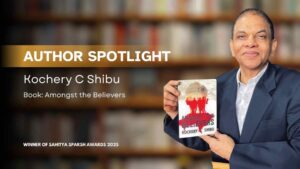Mayur Deshpande is an analyst by profession and a storyteller at heart. Hailing from the Vidarbha region of Maharashtra and now based in Pune, Mayur has transitioned from the world of business analytics to the world of words. His writing journey began with thoughtful articles on analytics but gradually evolved into full-length books that blend realism with emotional depth. His debut novel Mirrors of Self-Manifestation explored the relationship between a father and son, while A Tightrope Oracle is a deeply human tale that touches upon fate, morality, and hope in the margins of society. Inspired by his young daughter, Mayur writes with empathy and purpose, crafting characters that reflect the unheard voices of India.
The Shining Literature: What inspired you to create the character of Sarsi—a young girl with such a unique power and a powerful sense of morality?
Mayur Deshpande: Sarsi was inspired by the silent strength I’ve often witnessed in young girls from difficult backgrounds those who carry immense emotional intelligence, intuition, and an unshakable sense of right and wrong, even when life offers them very little guidance or support.
I wanted to create a character who embodies both vulnerability and quiet power. Sarsi’s unique ability is a metaphor for that deep, intuitive voice many of us carry but often suppress. Her power isn’t flashy it’s internal, ethical, and often painful to bear. That’s what makes her different. She doesn’t just have a power; she wrestles with the responsibility of using it.
Sarsi is also a tribute to the young girls who are rarely centered in stories of power, especially in traditional literature. She’s there to remind us that the most extraordinary characters can rise from the most overlooked corners of our world.
The Shining Literature: How much of Sarsi’s story is influenced by real-life experiences or communities you’ve observed?
Mayur Deshpande: Yes, I’ve met a few ropewalkers performing on the streets. I once spoke to a young girl among them her dream was to become a doctor. I wasn’t sure if her parents could afford to support that dream, but her ambition, despite the harsh reality around her, deeply inspired me. Another performer I met wanted to do something meaningful for their community. These two encounters stirred something within me, and I felt compelled to write a story that blends both a tale of resilience and hope, grounded in the struggles of street performers.
The Shining Literature: Your book beautifully blends magical realism with hard social truths. Was this blend intentional from the beginning?
Mayur Deshpande: That’s the hard truth of life. We all long for a little magic to turn things in our favor, but life rarely bends to our will. I wanted to write something that blends hope with hardship, dreams with struggle a quiet tribute to unseen courage.
The Shining Literature: What message were you hoping to send through the narrative arc of Sarsi, especially with her struggles around fate and free will?
Mayur Deshpande: Your ambitions should never be limited by your current situation. Some hidden talent that can lead you to the goals you’ve set.
And no matter how big the problem may seem, there’s always a way to give back. You can always support your community—what matters is the willingness to help, not the size of the act.
The Shining Literature: The father-daughter relationship is deeply rooted in the book. How much of it reflects your own experience as a father?
Mayur Deshpande: The father-daughter relationship is at the heart of both my books, and yes, it does reflect a part of my own experience and beliefs as a father. While the stories are fictional, they are deeply inspired by the emotional journey of fatherhood the quiet strength, the unspoken support, and the unwavering belief in a child’s dreams.
The Shining Literature: Sarsi’s powers often lead her to moral dilemmas. Do you believe real-life intuition or ‘gut feeling’ works in a similar way?
Mayur Deshpande: Absolutely. Sarsi’s powers, though fictional, are deeply symbolic of something very real—our intuition. In the story, her abilities often place her in situations where she must choose between what feels right and what seems right. That mirrors real life quite closely.
I do believe that our ‘gut feeling’ is a form of inner wisdom shaped by experience, empathy, and sometimes, the things we can’t yet explain. Like Sarsi, we often face moments where logic doesn’t give us all the answers, and all we have is a quiet voice within urging us in a certain direction.
The Shining Literature: Tell us about the process of writing the final scenes—especially the part involving Nathu and the narrator. Was it emotionally challenging?
Mayur Deshpande: Writing the final scenes, especially those involving Nathu and the narrator, was one of the most emotionally intense parts of the entire process. By the time I reached those moments, the characters had become more than just creations. They felt like real people, carrying real weight, with their own heartbreaks, hopes, and unfinished conversations.
Yes, it was emotionally challenging. There were pauses. Rewrites. Moments where I just sat with the silence, letting it all settle. But I knew that if the ending didn’t hurt a little to write, it wouldn’t feel honest to read. In many ways, those scenes wrote me as much as I wrote them.
The Shining Literature: What role do you think stories like A Tightrope Oracle can play in representing marginalized communities in mainstream literature?
Mayur Deshpande: Stories like A Tightrope Oracle have a vital role to play in representing marginalized communities in mainstream literature. They offer visibility to lives that are often overlooked, unheard, or misunderstood. Through fiction, The resilience behind the poverty, and the dreams that survive in the harshest of conditions.
With A Tightrope Oracle, I wanted to go beyond sympathy and portray dignity. The ropewalkers, street performers, and characters like Nathu are not just symbolic of struggle. They are symbols of strength, complexity, and aspiration. Literature allows us to show that being marginalized does not mean being voiceless or powerless.
The Shining Literature: How has your transition from writing analytical content to emotional fiction shaped you as a writer?
Mayur Deshpande: The transition from writing analytical content to emotional fiction has been both humbling and transformative for me as a writer. Analytical writing taught me structure, clarity, and discipline. Tt’s about precision, facts, and making a logical point. But emotional fiction? That’s where I found my soul as a writer.
The Shining Literature: What’s next for you? Are you planning more fiction, or will you return to your roots in self-help and personal development?
Mayur Deshpande: What’s next is something, a work of fiction that blends archaeology, mystery, and love. it unfolds a unique love story, one that’s drawn out of the soil, layered with history, memory, and emotion. So for now, I’m continuing down this creative path. This upcoming novel will not only explore the love between two people, but also the love we carry for forgotten stories, for the land, and for the past that still breathes beneath our feet.




